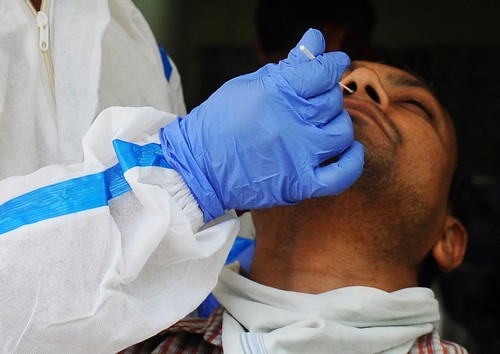New Delhi: Despite Centre’s advisory amid a spike in Covid-19 cases in India, testing rate in states remain low.
Experts here on Monday said that while mass testing may not be practical looking at the logistics, it may help understand the exact cause of the respiratory illnesses currently seen across the country.
According to Union Health Ministry data, India recorded a single-day rise of 628 new Covid-19 cases while the active caseload jumped to 4,054. The total fatalities were recorded at 5,33,334 with one new death reported from Kerala in the previous 24 hours, the data updated at 8 a.m. showed.
As per a recent survey conducted by LocalCircles, only 1 in 9 Indians with Covid symptoms are taking a RT-PCR test.
It noted that due to this India runs the risk of late identification of JN.1 variant in communities which can be an issue if it is causing severe disease in some people.
“Testing is not commonly done at all in India, because of many reasons. One, the public appears to think that the pandemic has gone away completely and will not come back. A good percentage of doctors also appear to believe that as well,” Dr Rajeev Jayadevan, co-chairman of the National Indian Medical Association Covid Task Force, told IANS.
“Secondly, Covid is no longer perceived as a threat as it used to be after vaccination covered most of the country, the severity of the disease came down significantly,” he added.
Moreover, the variants have changed to Omicron, hence the death rate has dropped. Therefore, people feel that testing might not make a difference in the treatment or the outcome.
In addition, even as many patients come in with symptoms of cold and fever to hospitals, it is impractical to send everybody for a Covid test besides the expense, the doctor said.
“Yet the downside of not testing is that we will not know the exact cause of the respiratory illnesses that are happening. The knowledge of which can help us customise treatment and prevention protocols. Without testing, we are effectively flying blind,” Dr. Jayadevan said.
The sudden surge in Covid cases in the country is believed to be due to JN.1, from the lineage of the Omicron variant of Covid. It is a descendent lineage of BA.2.86, with the earliest sample collected on August 25, 2023.
In comparison with BA.2.86, JN.1 has the additional L455S mutation in the spike protein.
First detected in Luxembourg in August, it is currently present in about 41 countries, including India.
Due to its rapid spread, the World Health Organization (WHO) classified JN.1 as a separate variant of interest (VOI), from the parent lineage BA.2.86. It was previously classified as VOI as part of BA.2.86 sublineages.
About 63 cases of JN.1 have reportedly been detected in the country till Sunday — Goa (34), Maharashtra (9), Karnataka (8), Kerala (6), Tamil Nadu (4) and Telangana (2).
“Currently globally, JN.1 is only a variant of interest, which means it is not of interest to the common people. In other words, it is not a risk to common people. And even if common people get it, they will recover within three to four days. They do not require hospitalisation, they are not dying. And that’s the reason that mass testing is not required,” said Dr Ishwar Gilada, Consultant in Infectious Diseases Unison Medicare and Research Centre, Mumbai.
“Till today, there is not a single death reported due to JN.1. Whatever deaths are being reported, about 4 or 5 are from the other variants of Covid, currently which are prevalent in India,” he told IANS.
Dr Manoj Goel, Director, Pulmonology, Fortis Memorial Research Institute noted that “mass testing is not a practical solution” for all.
He told IANS that “a vulnerable set of people like those above the age of 60 or are patients with diabetes, cancer, heart, or prevailing lung issues, experience cough, cold or fever then they must definitely get tested”.
“And for normal people who don’t have any such prevailing issues and are not very old, they must ensure isolation for the safety of others.”
“Mass testing involves a great deal of logistical coordination and financial resources,” added Dr Rajeev Gupta, Director – Internal Medicine at the CK Birla Hospital, Delhi.
“Robust contact tracing, quarantine procedures, and general preventive measures aimed at respiratory and contact transmission should be sufficient for now.
“Since influenza is currently the main culprit behind respiratory illnesses, offering a combined Covid-19 and influenza PCR test could be a practical approach. This would streamline testing efforts and provide valuable information about both viruses,” Gupta told IANS.
(Rachel V. Thomas can be contacted at rachel.t@ians.in)
–IANS


Comments are closed.